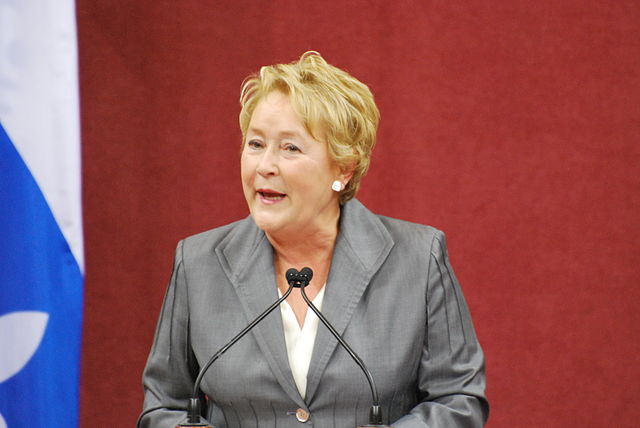Once upon a time, long ago, there was a progressive political formation in Quebec known as the Parti Quebecois. Times change, principles change. Yet since the PQ was seen, however misguidedly, to represent progressive values in an increasingly social democratic Quebec, the NDP decided to forfeit the idea of a Quebec branch.
For decades the national NDP tied itself in knots trying to appeal both to Quebec and to The Rest of Canada. This was no easy trick. How do you square an unyielding circle? The objective was to demonstrate to Quebec the NDP’s identification with its aspirations and to TROC the NDP’s repudiation of Quebec separation — the PQ’s very raison d’etre.
Many of us feared a PQ victory yet were thrilled when Réné Levesque won the 1976 election. Maybe it’s because we suspected — hoped — he really wanted not secession but simply more powers for a proud “nation.” Asymmetric federalism: that would do the trick, although the policy had little impact on the federal party’s success either in Quebec or TROC until Jack Layton’s final campaign.
The other NDP stratagem for wooing Quebec progressives was to accept the lowest possible threshold for a Quebec referendum on secession. All the separatists needed would be 50 per cent +1 vote to start the process of independence. To some this was the very definition of pandering.
Yet the NDP’s infatuation with the new Quebec over the past 50 or so years involved more than crass politicking. Nor was it only about the irresistible Levesque. After all, it was the Liberals who first ushered in the Quiet Revolution, ending the dark, cramped days of Maurice Duplessis’s Quebec. Duplessis, an ultra-conservative Catholic who persecuted Jehovah’s Witnesses, was responsible for the crucifix, Jesus and all, that hangs so prominently in the National Assembly.
It was not the PQ but a Liberal, Robert Bourassa, who introduced in 1975 the Charter of Human Rights and Freedoms, a splendid statement of the new Quebec’s values: openness, inclusiveness, equality, justice for all. It was the voice of the newly liberated, pluralistic, social democratic Quebec.
Even better, that Quebec Charter of Human Rights and Freedoms was unanimously approved by the National Assembly.
How remote that sweet incarnation of the Parti Quebecois now seems. We may well be witnessing the final victory of the small-minded, perennially insecure PQ, as reflected in Premier Jacques Parizeau’s blaming ethnic votes and money for separatism’s hair-breadth loss in the 1995 sovereignty referendum. Suddenly, it was them outsiders versus us of pure laine stock.
It is heartbreaking to find Premier Pauline Marois channeling Parizeau. Only two months ago, the Premier, to her shame, supported the Quebec Soccer Federation’s ban on kids in turbans playing soccer. Now that warped position is to be widened. A so-called Charter of Quebec Values is to be introduced. Although we don’t yet know its precise contents, there is good evidence to fear that the values it enshrines will be the precise opposite of the 1975 Charter’s: exclusive, mean-spirited, deliberately divisive — the very characteristics of a closed society.
If it indeed bans Quebec public servants — except perhaps Christians — from wearing religious symbols on the job; if Quebeckers will be refused employment in the public service for wearing an innocuous skullcap or turban or kerchief; if Quebec citizens are banned from accessing everyday public services for daring to wear such trappings of their faith; if the National Assembly’s crucifix — magically a cultural, not a religious, symbol — remains sacrosanct, then we have come to a new low in our history.
Even as someone who’s personal relationship with religion ranges from indifference to hostile, let me say that I find Premier Marois and her followers guilty of le bigoterie, le racisme and l’intolerance. In Marois-speak, naturally, the new initiative is couched in terms of unity and respect. In reality, as the world pays homage to the 1963 March on Washington, the Parti Quebecois seems prepared to turn Martin Luther King’s dream into a cauchemar.
Putinesque, my old Quebec friend Prof. Charles Taylor calls it, and indeed it will force into the closet those who want to survive in pure laine Quebec. Yet the challenge of a truly enlightened society, Ghanaian American philosopher Kwame Anthony Appiah tells us, is “to embrace what is rich, productive and creative” about its differences.
With no objective social problem to deal with, why is the minority PQ government taking this retrograde step? Is it simply the cynical act of a party that must face a difficult election very soon? Is it nothing more than anti-Muslim sentiment that must scapegoat other visible minorities to disguise its prejudice? Is it rote emulation of developments in France? We may never know, and in ethical terms the motives are irrelevant.
All those who stand for a just society will condemn the PQ’s proposed Charter of Quebec Values in the most unequivocal way. If I could find it, I would even wear my kippa.
This article originally appeared in The Globe and Mail.
Image: wikipedia commons



